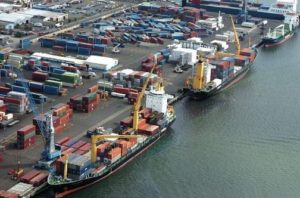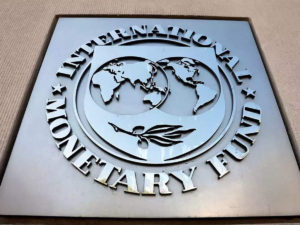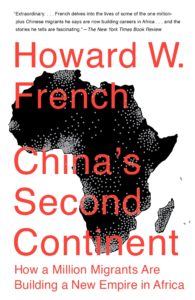Chinese Covert Domination of African Resources
China adds to their portfolio of African financial resources the Port of Kingston, Jamaica.
With the acquisition of the Port of Kingston, Jamaica, one of the busiest ports in the Caribbean, China has taken another slice of the African economical pie. Under the guise of assisting in the development of so-called ‘poor/Third World countries, the Chinese have been insinuating themselves into African countries at a rapid pace. Many underestimate the intelligence of these Asians thereby paying little or no attention to their investments in neighboring countries. With their attractive contractual offerings, Third World nations jump at the offers of investments, seemingly in their favor.

How Has China, a Communist Country, Been Able to Find Favor in Democratic Countries?
The Chinese, although being represented by a small minority in Africa and the Caribbean for centuries, would not have been welcomed so easily and widely by democratic governments whose needs were being met and to whom reasonable aid was being offered by European and North American countries. Not that other countries are being blamed for the predicament we find ourselves in, however, there is an idiom that sums up the situation precisely: “A drowning man catches at a straw.” This does not necessarily make it right nor does it signify that everyone is in agreement. Notwithstanding, we can all understand the immediate economic reasoning why the door was opened and the red carpet, no pun intended, laid out for China.
China vs IMF
Some may argue that Third World countries have been receiving aid from North America and Europe via the Inter-Monetary Fund aka IMF, for years. Aside from disaster relief, people need to look closer at the aid that was being offered and the conditions that were attached. While the IMF stipulates how their fund which is a form of loan should be spent, the Chinese do not. The IMF in their misguided effort to help these countries out of their dependency on developed countries, implement stringent policies that not only demoralize the population but also sink these countries into a deeper economic depressive state. The interest rates on loans and the living conditions that governments are forced to impose on the populace are not favorable, thereby, making any alternative offer with an appearance of less stringent policies more attractive. The Chinese, fair trade or not, pertaining on which side of the fence you are standing, offered a more reasonable alternative in the immediate circumstance. Governments looking for a band-aid to stem their economic flow, opt for the offer of trading their land for investments that do not require the countries’ capital input. Instead of long term healing of their economies, they trade away their resources for a quick fix. This is what China offers, a quick economic fix and inferior industrial constructions such as the building of highways and other road improvements with the promise of maintenance for decades. These contractual arrangements give China the legal rights to not only bring in labourers, but also to remain in these countries for years. With China owning these —-with the agreement that they are to collect a significant portion of the revenues gained from tolls for example, and mining rights to state owned reserves, green areas are fast disappearing along with some of Jamaica’s indeginous plants and animals. This will spell disaster for the population eventually.

Dangerous Precedence This new idea of gifting a country’s resources as payment for so-called infrastructural development as roads is setting a dangerous precedent for small countries such as Jamaica. These small islands do not have the might nor the financial resources to ward off a takeover if China chooses to change the terms of their agreement. Giving real estate as payment to foreigners is like giving away your heritage, bearing in mind that once you own property in Jamaica, you have the same rights as citizens. “Yes, foreigners can buy property in Jamaica and the Government of Jamaica welcomes investment from overseas buyers. There are no restrictions on foreign buyers acquiring real estate in Jamaica and foreign buyers enjoy the same rights as Jamaican citizens.” https://www.7thheavenproperties.com/destinations/jamaica/#: “The size of the Chinese investments in Jamaica is said to be around US$3 billion and growing, leading many people to wonder what is the attraction. It turns out that it is easy for Chinese firms to set up shop in Jamaica, and they are loving it – even the test of wringing profits out of challenging businesses. That is the sentiment of China’s top diplomat for economic and commercial affairs in Jamaica.” http://jamhttp://jamaica-gleaner.com/article/business/20191220/ease-doing-business-fuels-chinese-investments-ja# With their belief that they are supposed to rule the world, China appears to have been planning their ‘takeover’ for years; quietly building their army and weapons of war while the world focuses on other countries that are already at war. However, China’s influence in African countries was not acquired by military might but by economic investments. The Cockpit Country is Jamaica’s most important watershed/green area. It is home to the Island’s indiginous plants and animals. As a small island of only 1,022 km or 634 miles around the coastline, green area is limited. It was an unwritten law that the Cockpit Country be exempt from mining. Chinese developers have now convinced the government (over the protests of citizens) to give them permission to mine the area. This area is the major source of Jamaica’s oxygen. China now owns Jamaica’s most lucrative port, natural reserve, major highways, bauxite industry, some sugar factories (which they have closed) and several acres of prime land. While investments were needed and are welcomed, it is the protocols attached to these seemingly lucrative deals that are of serious concern. It appears as if no one is keeping a record of how much (percentage ) of these countries are now owned by China and the implications should China wish to collect or anul their contracts. Aside from bartering away prime lands, governments, in their alacrity to boost their economy and to secure much needed foreign investment, leaders sign off on contracts without contemplating future repercussions. Governments are pressured to give visa and other preferences to Chinese nationals with little or no security checks. Selling off your natural resources and allowing foreigners to invest in your basic infrastructure is a dangerous precedence. Whoever controls a country’s telecommunication, utilities, energy, natural resources, can eventually control the government. “Staying on with a different visa status is possible because of China’s clout with the countries in which it has invested. One of the unwritten conditions of many official deals with African countries is that the government should be lenient in granting visas to Chinese citizens. There are many who have received the government’s help and encouragement to settle in different parts of the world to do business.”
Implications of Chinese Entrenchment in Jamaica
While in dire need of foreign investments, Jamaica is intrinsically linked with North America not only by trade, labour and tourism. but also geopolitically. The similarities in the system of government and its location are also contributing factors. With the current trade war looming between China and the USA, Jamaica can find itself in an unenviable position. Not being able to repay China for its investments coupled with the inability to sustain itself, the Island is in no position to make a choice between these two nations. The island relies heavily on the seasonal employment offered by the American entertainment industry, farm workers program and immigration opportunities to earn foreign currency. Although earning less than minimum wage in nearly all instances, these workers look forward to these job opportunities each year. A trade embargo by the US against Jamaica would be quite damaging to the country’s economy and existentially.

(Could any country within the African diaspora defend itself from China or any other Western nation?)
China’s Investment In Africa
“The level of China’s investment in the continent of Africa has been increasing at a steady rate. At the 2018 China-Africa Cooperation Forum, China announced it would be providing $60 billion in financial support to Africa.” https://www.investopedia.com/articles/active-trading/081315/3-reasons-why-chinese-invest-africa.asp Ideally, there is nothing wrong with foreign investments in so-called Third-World Countries. What needs to be considered are the motives behind these ostensibly, ‘innocent” investments. Africa has been resourcefully raped so many times that the continent has been downgraded from the richest civilization; developmentally, economically and educationally, to the ‘poorest, most depressed continent today. (However, Africa still has some very desirable natural resources’———–) “Time and again Chinese told me they did not fully realize how oppressive things were at home until after they had left … now, they could breathe,” French writes. Ironically, the same freedoms and individual rights may not be available to Africans working for Chinese companies or on Chinese government projects. Staying on with a different visa status is possible because of China’s clout with the countries in which it has invested. One of the unwritten conditions of many official deals with African countries is that the government should be lenient in granting visas to Chinese citizens. There are many who have received the government’s help and encouragement to settle in different parts of the world to do business.” China’s Second Continent: How a Million Migrants Are Building a New Empire in Africa

With China expected to surpass the U.S. as the world’s largest economy within the next decade, serious concerns have emerged that China may rule the world in the foreseeable future. The worry is not necessarily over China’s potential power, but that China’s dominance could lead to the prevalence of the Beijing Consensus, which is based on the value that a government-defined collective good should take precedence over the rights of the individual, be powered by a “socialist market economy” with strong state intervention, and be governed by single-party rule. https://asia.nikkei.com/Opinion/Does-China-really-want-to-rule-the-world
KEY TAKEAWAYS
- China’s amount of foreign direct investment in Africa has grown rapidly over the last decade.
- China focuses many of its investments on Africa’s abundance of raw materials needed for the production of goods, such as platinum, cobalt, manganese, and uranium.
- China is politically motivated to invest in Africa because the continent represents a prime opportunity for China to significantly expand its global presence and influence.
- Africa is an emerging market and offers China a chance to achieve growth and high returns from its investments.

Political Motivations
The African continent is a logical place for China to look to extend its geopolitical influence. China is already the preeminent power in Asia. India, a historically traditional rival of China, is not a realistic choice for China to look for an increase in political influence, but the largely undeveloped countries of Africa represent a prime opportunity for China to significantly expand its global presence and influence in the world. The nature of China’s political motivations are partially revealed by its extensive investments in African infrastructure, as can be seen in the funding it’s provided through the China-Africa Development Fund. If China can rise to a position where it exerts major control over essential economic elements such as the utilities sector and telecommunications in African countries, while also developing military influence, then it also holds considerable political alliance in those nations https://www.investopedia.com/articles/active-trading/081315/3-reasons-why-chinese-invest-africa.asp
Summary: Whoever controls a countries telecommunication, utilities, energy, natural resources, can eventually control the government.

